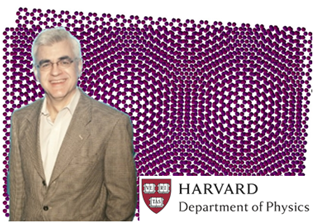NOMATEN HYBRID-SEMINAR June 7: Twistronics: a new platform for exploring physics and applications in 2D
Meeting ID: 949 0667 4246
Access code: 545531
In-person: Auditorium 0.06 of Department of Physics, University of Warsaw
Location: https://goo.gl/maps/zohWBc
NOMATEN HYBRID-SEMINAR
online: https://uw-edu-pl.zoom.us/j/94906674246?pwd=WUtEcmlIYmlXSVlsVjkwZC8wNkZGQT09
In-person: Auditorium 0.06 of Department of Physics, University of Warsaw: https://goo.gl/maps/zohWBcS8XFxMgsK17
Wednesday, June 7th 2023 13:30 CET
Twistronics: a new platform for exploring physics and applications in 2D
Dr. Efthimios Kaxiras
John Hasbrouck Van Vleck Professor of Physics and Chair, Physics Department
Harvard University, USA.
Abstract:
When layers of two-dimensional (2D) materials are stacked on top of each with a relative twist, the resulting reconstruction pattern ("moiré pattern") dominates the electronic behavior. Depending on the twist angle, the moiré scale can be several orders of magnitude larger than the scale of the underlying atomic lattices, and the lead to emergent behavior, including superconductivity. This field of physics in 2D materials has been named “twistronics”. In this talk we will review studies of such systems using ab initio-derived effective hamiltonians that capture the physics accurately and efficiently. The results of these computational studies provide insight into the underlying nature of electronic states and phonon modes which are sensitive to the twist angle and stacking composition. These findings also provide guidance for understanding the observed correlated states, superconductivity, and the experimental realization of novel devices.
Bio:
Dr Efthimios Kaxiras is the esteemed John Hasbrouck Van Vleck Professor of Pure and Applied Physics at Harvard University, Massachusetts. He is recognized for his exceptional contributions to the field of physics and holds joint appointments in the Department of Physics and the School of Engineering and Applied Sciences. Additionally, he is an esteemed affiliate of the Department of Chemistry and Chemical Biology, further showcasing his multidisciplinary expertise. As the Founding Director of the Institute for Applied Computational Science, Dr Kaxiras has played a pivotal role in advancing the application of computational methods in scientific research. His visionary leadership has contributed to the establishment and growth of this esteemed institution, providing a platform for cutting-edge computational research and fostering innovation at the intersection of science and technology. In recognition of his outstanding contributions to the field, Efthimios Kaxiras has been honored as a Fellow of the American Physical Society, showcasing his exemplary achievements and influence within the physics community. Furthermore, he has been recognized as a Chartered Physicist and Fellow of the Institute of Physics, London, solidifying his status as a highly esteemed and respected physicist.
Tags







